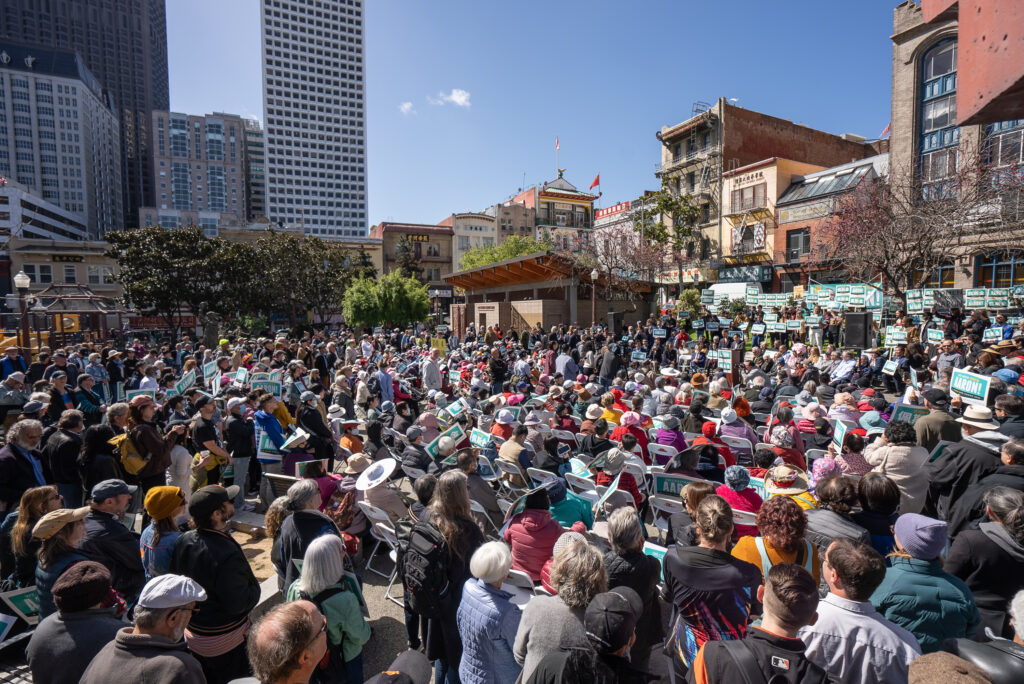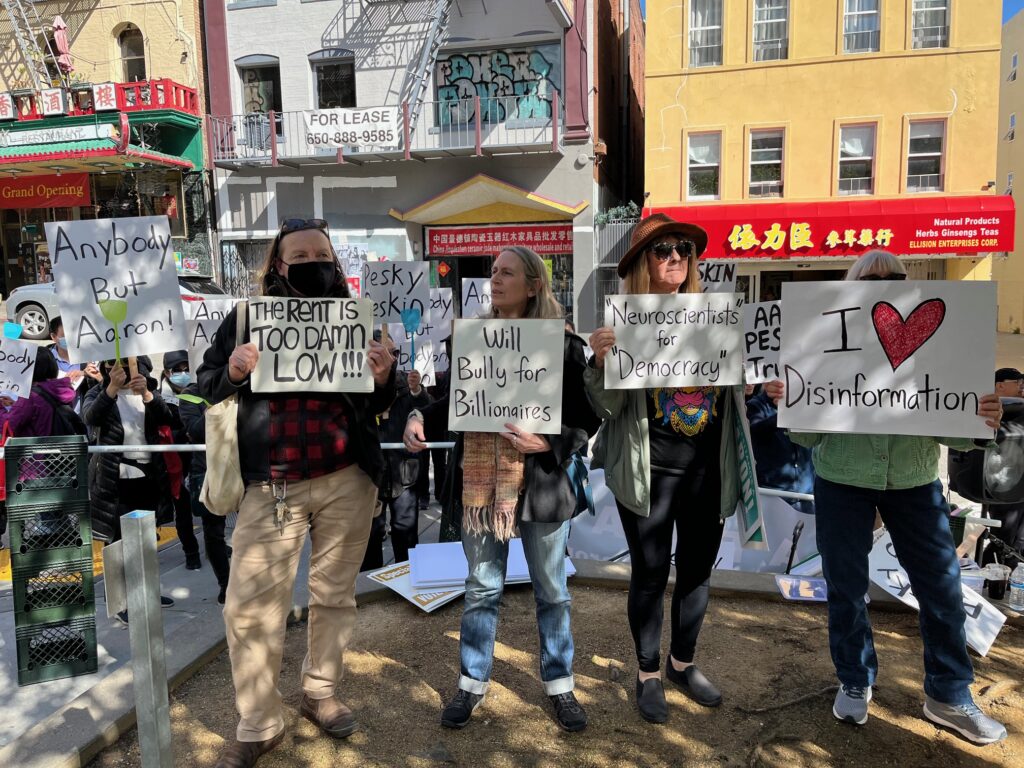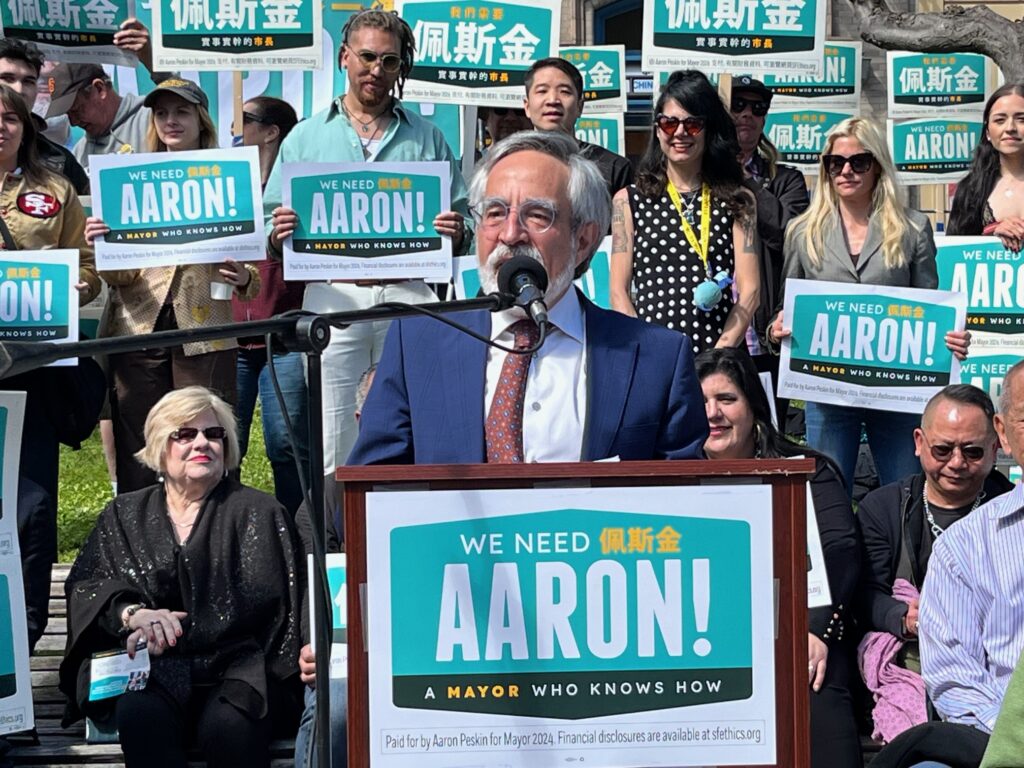It’s always hard to estimate crowd size, particularly in a crowded place like Portsmouth Square, but I would say at least 750 people showed up today for the Aaron Peskin for Mayor kickoff, and that might be low. Could have been 1,000.
Either way, it was a massive show of support for a candidate who has been resoundingly attacked in the news media as “anti-housing” or “anti-progress.” It was the largest political campaign kickoff I have seen in many, many years.
The resounding message: Lots of people in San Francisco weren’t happy with the collection of right-wing candidates, and want another alternative.

Oh, and there was a “counter protest,” organized in part by tech mogul Garry Tan, who has like half a million Twitter followers. Those folks love to complain on social media, but they apparently don’t actually turn out: The mainstream media generously cited 30 people, but I counted closer to 15.
They appeared with signs and messaging calling Peskin a “pest,” and they used flyswatters as visuals. Comparing a Jewish candidate to a bug that needs to be eradicated is not a good look, Garry.
So that was a total bust.

Meanwhile, the square was packed, enough that it was hard to get around. At least 200 members of the Chinatown Community Tenants Association were there. Rev. Norman Fong, former director of the Chinatown Community Development Center, gave the invocation and blessing.
Former Mayor Art Agnos was there. Local political legend John Burton was there. Former state Sen. Mark Leno was there. Sups. Hillary Ronen, Connie Chan, and Dean Preston were there. Former Sups. Tom Ammiano, Jake McGoldrick, Eric and Gordon Mar, Sandra Lee Fewer. Bevan Dufty, and Norman Yee were there.

Peskin took on his critics directly:
it appears that the strategy of my opponents is to drown out any voice they disagree with. I believe San Francisco deserves a mature discussion about our future – not a shouting match.
Let’s be clear. These are the angry voices of a vocal minority, amplified by the money of billionaires, who are deadly afraid to have San Francisco hear any voice but their own.
More:
I will be a Mayor who loves this city, and doesn’t beat up on it for political gain.
That is: Someone who doesn’t create a doom loop to get rid of a district attorney she doesn’t like, then has to live with the consequences.
A Mayor who works for everyday San Franciscans and their neighborhoods, not just the well-to-do and the well-connected.
That is: Somebody who isn’t supported by the billionaires.
He talked about how his approach to public safety—which involves culturally sensitive police foot patrols, has worked in his district:
I have worked a quarter of a century with the officers on the beat in Central Station, and know first-hand how effective community policing can be.
Then he put the focus back on the current administration:
But while we focus on crime in the streets, we must also address criminality and corruption in City government. Every crime of corruption is a crime against taxpayers, a crime against city services, and a crime against the public trust.
That is: This mayor has overseen an administration where two department heads are spending time in prison, and many others have faced criminal charges.
And he talked about what I suspect will be a theme of his campaign: The Breed Administration has been great at blaming others for the city’s failures.
It is not leadership to keep finding other people to blame for homelessness. They’ve blamed compassion. They’ve blamed non-profits. They’ve blamed progressives. They’ve blamed judges. But at the end of the day, the buck stops with the mayor.
He said he supports efforts to end the state law that limits rent controls on vacant apartments and exempts tens of thousands of units:
And we have a chance to expand rent control across California this November by voting to eliminate Costa Hawkins. If it is successful, as Mayor, I will immediately expand rent control to the 40% of San Francisco tenants who don’t benefit from it today because of Costa Hawkins.
He directly took on the argument that he’s somehow anti-housing because he doesn’t think that luxury apartments are the solution to the city’s crisis:
There are those who claim we don’t need to focus on affordable housing. Who advocate just for more and more and more luxury housing. Who tell us that some time, somewhere in the far distant future, these luxury homes affordable only for the rich will magically become affordable for the rest of us.
It’s rubbish. In the Reagan era it was called trickle-down economics. It didn’t work then and it doesn’t work now. It doesn’t work because it just boils down to deregulation for private developers, and there is no profit in building affordable homes. … The archipelago of our neighborhoods and cultural districts is what makes the tapestry of San Francisco so rich. Their future should not be decided by unaccountable planners, real estate speculators and Sacramento special interests.
That’s part of what could be a winning strategy, one that appeals both to progressives and the West Side.
At this point, with Peskin formally running, the race is wide open. I don’t see any candidate who is a clear front-runner. Breed is in serious trouble; as Mission Local reports, two of her main opponents, Mark Farrell and Daniel Lurie, are split mostly over
“send armed National Guardsmen into the Tenderloin” vs. “Send in Seal Team Six!”
Peskin will have to make sure he secures strong support in a progressive community that may need some convincing. Peskin is not a leftist; he’s certainly not a Democratic Socialist. But the backing of the likes of Ammiano, Preston, and Ronen will be a huge help.
And there’s nobody else in that lane right now.
Then he will need to build a coalition between the progressives and the more conservative neighborhoods. Those of us who have, as my eye doctor politely says, “accumulated some birthdays” refer to that as the “Prop. M Coalition” that in 1986 put strict limits on office development (in part to make sure there was enough housing for the new workers).
A year later, that coalition elected Art Agnos mayor.
A Peskin campaign could have impacts beyond the top of the ticket. Ammiano didn’t win in 1999, but he galvanized a movement that a year later elected a strongly progressive Board of Supes. The progressive, pro-neighborhoods turnout for Peskin for Mayor could help the re-election of Preston and Chan.
The billionaires will pour money into attacking Peskin, mostly, I think, because they fear a mayor who is willing to challenge and regulate tech. (The “anti-housing trope is a smokescreen; these very rich folks don’t care about affordable housing, and if they did, they’d support higher taxes on their fortunes to pay for it. They don’t want a mayor who will mess with their business interests.)
So the San Francisco mayor’s race is now a whole new ballgame, with very high stakes. Here we go.
Full disclosure: My son works on the Peskin for Mayor campaign.






